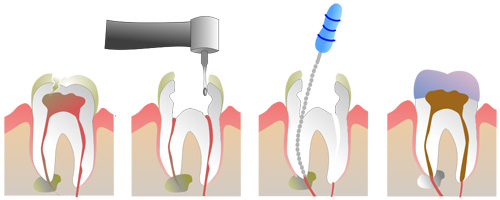Cosmetic & Restorative Dentistry
Root Canals
Inner Tooth Infections
A “root canal,” or pulpectomy, is a treatment for infections in the soft inner tissue of a tooth. Root canal infections can spread into the outer areas of the tooth, causing discoloration. If left untreated, they will affect the health of the jaw and other tissues surrounding the tooth.
About Root Canal Therapy
Root canals are the thin passages that run from the soft inner tissue of your tooth (pulp) to the tip of the root of your tooth. These canals may become infected in a variety of ways, most commonly as a result of untreated cavities. Because the canals contain nerve fibers, infections of this sort are often accompanied by varying amounts of pain.
Root canal procedures not only preserve your dental and oral health, but also improve the appearance of teeth darkened by infection. They are likewise a preventative measure to help you to avoid costly restorations to replace a tooth lost to decay and infection.
Aren't Root Canals Painful?
Many people are concerned by the potential pain of a root canal procedure. You may be surprised to learn that modern day root canal therapy is usually painless and no more uncomfortable than having a filling placed.
Procedure
After sufficiently numbing the area, the doctor creates an opening on the surface of the tooth. He then removes any decayed tissue or bacteria. An instrument called a root canal file is then used to remove the nerve fibers and clean out infected tissue from within the thin canals. We use magnifying equipment to aid in the procedure.
Next, the inside of the tooth is thoroughly cleaned and supplied with initial filling material, accompanied by medications to soothe the area.
A final filling, such as those used to fix cavities, is applied to the surface of the tooth. In many cases, a crown is placed instead of a filling to provide more structural support for the tooth.
Most often, both the diagnostic exam and the root canal procedure can be completed in one office visit.


